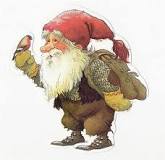WINTERS COME AND WINTERS GO
Terry Donnelly
Dec 25, 2019 |
There is much joy today celebrating the spirit of Christmas Day. Tonight, homes will become quiet and peaceful in both reflection on the holiday and pensive about what is yet to come. The excitement of the season leading up to today, and the bustling activity brought the celebration to its crescendo and now will yield to night––the gateway to tomorrow. To illustrate, there is no better representation of the quiet of a content and sleeping family than the stories of the Tomten. Viktor Rydberg wrote the poem in 1881 and Astrid Lindgren retold one of the stories in her 1961 picture book with classic illustrations by Harald Wiberg.
In Scotland they are called Boggarts; in Ireland, Leprechauns; elsewhere Gnomes, or Gremlin; to Shakespeare it was Puck. Tomten are the Swedish version of solitary, mischievous sprites who lurk, out of sight, around corners, lodged in pantries, or burrowed beneath piles of hay in a farmer’s barn. They take on the awesome responsibility of protecting the welfare of homes and farmsteads. Tomten are most needed on the long, cold winter nights, especially this night, Christmas night.
The family Tomten is seen by farm animals, pets, and children, but never by adults. He is gleeful in making his presence known to the adults by leaving a small, melting dollop of snow in the hall from his tiny footprint. “How did that snow get in here over night?” the father may ask rubbing his chin in question. The Tomten often likes to hide in corners and watch Father scratch his head as he realizes he’s already read these few pages in his book. Tomten moved the bookmark. Mother isn’t immune. She wonders how her cross-stitch project got several stitches further along and whatever happened to that last swallow of cranberry juice she was saving for breakfast?
Tomten doesn’t just tease adults. He has a long list of important tasks to perform around the farm every night. He comforts each farm animal with a silent language that they exclusively share. He can ease any discomfort of cows lowing in the barn and provide warmth for his friend the dog in his kennel by building a soft and cozy nest of straw. Tomten watches as the dog happily begins to dream of chasing rabbits and barking at birds.
Farm buildings are Tomten’s venue. He treks, seen or heard by no one, between sheds and barns. Checking to be sure all is closed up tight for the night. If he finds an open gate, he closes it with only a faint squeak from a rusting hinge and the subtle click of the latch momentarily interrupting the silence.
Tomten saves his most important duty for last––the children. He creeps into their room and through the dim illumination of the nightlight he checks to see if they are properly tucked in and safe. Occasionally one is stirring and awake. On these nights Tomten pulls up a chair and sits next to the youngster and they chat about the mysteries of life. Soon, reassured, and with a smile, the child finds blissful sleep.
He assures every child that this deep, dark, cold winter, when everything outside they love to explore and play in during summer seems to have gone forever, is simply resting and renewing for an even better spring. Spring is on the way and even though these days seem short and dark, if they pay close attention, children can see the sun shining earlier and setting later each day as a promise of warm weather on its way.
Tomten knows of such things because of his solitary life. He has hours and hours to spend in contemplation. Because he is old, his philosophy is sound and respected by the children and animals. Even though the parents do not share in his stories and comforting thoughts, he is their solemn partner in managing the farm and assisting the children along the path of the wide-world’s ways. They will remember him, be comforted, and assured by their memory of him long after they can no longer see or talk to him.
With his chores now complete and a few hours to go before the sun will begin to stir activity on the farm, Tomten wends his way back through the maze of buildings to his corner in the hayloft. There the cat is waiting. She is expecting him and the milk Tomten always provides. “Tomten talks to the cat in Tomten language, a silent little language a cat can understand. ‘Of course you may stay with me, and of course I will give you milk.’” *
Now everyone is asleep. The adults have been quiet for hours and Tomten has soothed the anxious child. Even the cat is purring, nestled in the hay, after her treat of warm milk. Everyone is asleep––everyone but one. To this Tomten the sign that summer is near will be the return of the swallows. Now, he can rest and enjoy his own dreams. “Winters come and winters go, Summers come and summers go, Soon the swallows will be here.”* He respects the quiet and knowingly smiles because, due to his care, the biting cold will not adversely affect his family. Now everyone can, in their own way, look forward to the return of the swallows.
*”The Tomten,” Astrid Lindgren.

No comments:
Post a Comment